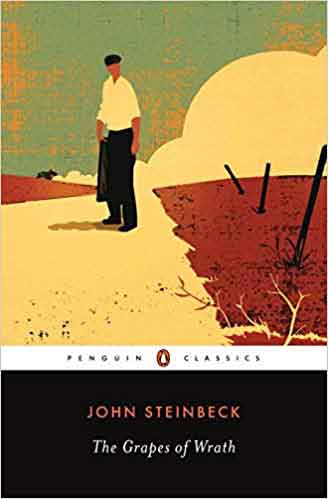
Impacts of unjust systems manifest in many ways, but few are as poignant as independent , proud farmers being displaced from their farmland and forced to migrate to a distant and unknown place to seek work in uncertain conditions. We in India are all too familiar with this on-going , overwhelming reality of our times, our country and this is all the more reason for remembering the most memorable story ever told on this theme—John Steinbeck’s The Grapes of Wrath (1939). That this novel was the main contribution on the basis of which the noble prize for literature was awarded to this great American writer is only the lesser reason why this novel will never be forgotten, the main reason being the enduring relevance of this epic saga of despair and hope for all times.
Set against the background of the Great Depression and the dust bowl disaster of the 1930s in the USA, this epic book tells the journey of the displaced Joad family from the Oklahoma across a vast desert to the fruit gardens of California in search of new livelihood. The struggles of this family and its various members are inter-woven with the larger reality of the displaced farmers moving away from ancestral homes as migrant workers in a cruel system.
The scenes and episodes of the book are so gripping in their stark reality that any artificial dramatic effect is not really needed. While the deprivation and humiliation of once proud farmers, the injustice and exploitation involved in this, is cruel and evokes anger, at the same time there are episodes of great tenderness in human relationships as well as of very strong solidarity. These remain with us for a long, long time. The characters of Ma ( the mother in the family). , Tom Joad and Casy in particular cannot be forgotten. Both in togetherness and in bouts of disintegration, the story of the Joad family is gripping and the reader feels very close to their sufferings as well as to their smaller moments of joy or relief. Ma has such strong feelings for all family members yet her tremendous resilience is overwhelming and enables the family to survive many a crisis.
While there are so many memorable episodes in the book that it becomes to single out a few for special mention, attention may nevertheless be drawn to some of the opening scenes in which farmers stand together after a dust-storm and learn about the decision of the bank to evict them, including the debate that a farmer has about whom to blame and punish for this injustice. Then towards the end when Tom has to leave the family and has maybe a last conversation with his mother, this is something that just cannot be forgotten.
As the narrative of the Joad family is inter-woven with that of the countless families on the road and facing similar problems and predicaments, the reader is constantly reminded of the wider reality of the mass suffering of those days and the injustice involved in this. Hence the family saga is not seen in isolation. This is perhaps an important factor why the novel was so effective in drawing attention to the injustices faced by displaced farmers in the wake of the great depression and the dust bowl phenomenon. In fact the book was preceded by a series of brilliant newspaper articles on the subject by the author.
This novel was first published in 1939 and by February next year 430000 copies had been printed . The novel soon won the National Book Award and then the Pulitzer Prize for fiction. A widely celebrated film was also made the same year ( 1940), directed by John Ford and starring Henry Fonda in the lead role of Tom Joad. The book and the film provoked a lot of questions on the injustices of farming systems, particularly those relating to farm labor in California.
Eight decades after its publication this book remains one of the greatest ever sagas of working class life. There is only one upsetting aspect of this book which too must be mentioned in all honesty. Steinbeck made use of field-notes of a writer and researcher Sanora Babb who was also planning to write a novel of this theme. He should have made this acknowledgment. Once The Grapes of Wrath had been distributed widely, Sanora had difficulty in getting her novel published and this was delayed for a long time. Her novel Whose Names Are Unknown was finally published much later in 2004, just a year before her death, leaving her with understandable bitterness.
This is an unfortunate episode that could have been avoided and our sympathy remains with the wronged, lesser known writer. Nevertheless this does not distract from the great achievement of The Grapes of Wrath, which will remain one of the biggest achievements for literature of the oppressed.
Bharat Dogra is a journalist and author. His recent books include Planet in Peril and Ummeed Mat Jhorna ( Collection of Hindi poems and songs).
GET COUNTERCURRENTS DAILY NEWSLETTER STRAIGHT TO YOUR INBOX
















































